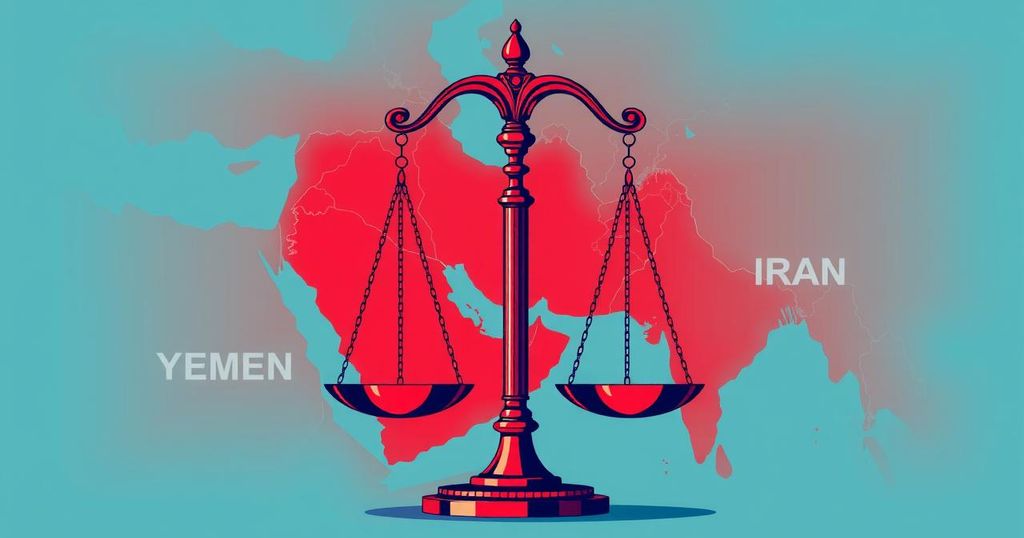Trump Increases Pressure on Iran Over Houthi Attacks in Yemen
President Trump has intensified his rhetoric against Iran, threatening to hold it accountable for Houthi attacks conducted in Yemen. This warning follows recent U.S. military interventions in the region, marking a potential escalation towards military action against Iran itself. The situation combines ongoing tensions over Houthi strikes on vessels and Iran’s nuclear ambitions, complicating U.S.-Iran diplomatic relations at a critical juncture.
In a significant escalation of tensions, President Donald Trump has issued a warning to Iran, stating that the country would be held accountable for any attacks conducted by Houthi rebels in Yemen. This statement comes following recent U.S. military actions targeting Houthi positions. Trump conveyed his concerns on his platform, Truth Social, emphasizing Iran’s connection to the Houthi attacks and the implications for U.S. military response.
The Houthis have engaged in multiple assaults targeting Israeli and commercial vessels in the Red Sea, amidst their protests against Israel’s military actions in Gaza. There is a widespread acknowledgment among experts that Iran supplies arms to the Houthis, who are part of a broader anti-Israel coalition supported by Tehran. Trump’s comments signify a marked escalation of his stance, suggesting possible military action directed at Iran itself.
Trump declared that from now on, any action by the Houthis will be regarded as a direct attack from Iran, and warned that such acts would lead to severe consequences for Tehran. He has historically pressed Iran to cease its backing of the Houthis but now indicates a willingness to extend military responses beyond Yemen, especially as diplomatic efforts with Iran have encountered significant obstacles.
The complexity of U.S.-Iran relations is amplified by Trump’s previous withdrawal from the Joint Comprehensive Plan of Action (JCPOA) in 2018, along with recent communications in which he cautioned Iran against nuclear escalation. Ayatollah Ali Khamenei has dismissed Trump’s overtures as bullying, maintaining Iran’s position that its nuclear endeavors are solely for civilian purposes.
Moreover, the U.S. has intensified military engagement against the Houthis after they threatened to prohibit Israeli vessels from entering specific waterways. In response to this, Trump authorized military strikes against Houthi positions, resulting in significant aerial bombardments and casualties in Yemen recently. Trump issued strong warnings to Iran, demanding an immediate cessation of its support for the Houthis, emphasizing the risk of dire consequences.
The Houthis, having conducted extensive operations against vessels in the region, have countered Trump’s military actions with threats of retaliation. Observers note that Trump’s aggressive stance seems at odds with his previous campaign promises to withdraw from foreign conflicts. Some analysts suggest that these military actions may serve to pressure Iran into negotiating over its nuclear program, reflecting a strategic decision amid Trump’s reelection campaign.
In conclusion, President Trump’s warning to Iran regarding the Houthi attacks represents a significant escalation of U.S. military policy in the region. His statements indicate a willingness to hold Iran accountable for proxy actions and a potential shift towards increased military engagement. As tensions rise, the implications for U.S.-Iran relations and regional stability remain uncertain, particularly given the Houthis’ commitment to retaliate and Trump’s aspirations for nuclear negotiations with Tehran.
Original Source: www.aljazeera.com




Post Comment